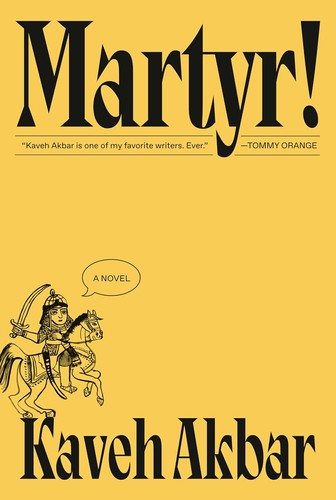Kaveh Akbar's Martyr!
Martyr!

Martyr! made me laugh and it made me cry. It’s playful and explosive like the Jonathan Safran Foer novels I adored as a teenager. In Everything is Illuminated or Extremely Loud and Incredibly Close, calls to seize the day resonate powerfully in the shadow of cataclysm. Martyr! taught me—or rather, reminded me—that every person’s life can have immeasurable meaning, even if they don’t change the course of history.
Our protagonist is the poet Cyrus Shams. When Cyrus tried alcohol for the first time as a freshman, he drank ravenously, without moderation, to fill a void. You see, he was only an infant when his mother Roya died in a senseless tragedy: she was on a commercial plane that was shot down by the US military. A mere blip for Iran, a country consumed by war with its neighbor Iraq, the tragedy threatened to eat Cyrus’s father alive. “Ali’s anger felt ravenous, almost supernatural, like a dead dog hungry for its own bones.” Unable to stay in Iran, Ali takes his son to Indiana, where he raises Cyrus alone, drinking gin every night, “but only medicinally,” he says, so that he can get to sleep before his early morning shift at a chicken farm.
The story starts in earnest in 2017. Cyrus, two years sober, is still living in his college town, working as a medical actor: every day he assumes the identity of a different imaginary patient, testing medical students’ ability to deliver a diagnosis with compassion. An especially memorable early scene shows him tormenting a hapless resident who rubbed Cyrus the wrong way. When the resident calls him “Miss Kaufmann,” the name on her sheet, he corrects her: “Mr. Kaufmann may be dead, but I am still his wife.” This hyper dramatic, over-committing to the bit is one of the things that makes Cyrus such an entertaining narrator.
Bored by his dead-end job, and frustrated by the stifling environment of his Addicts Anonymous group, Cyrus is convinced by his friends to leave Keady University for a trip to Brooklyn, where an Iranian artist named Orkideh is doing an art installation called DEATH-SPEAK. She was diagnosed with terminal cancer, and has decided to stop treatment so she can spend her final days talking to people about death. Cyrus hopes that Orkideh will inspire him on his latest writing project, “Book of Martyrs,” which chronicles the lives of people who found a way to make their deaths matter. After all, Cyrus thinks, isn’t her art doing just that?
When she meets Cyrus, Orkideh quickly pokes the holes in his self-serious mission. Doesn’t he worry about becoming a cliché, she asks? “Another death-obsessed Iranian man?” she teases him, and they strike an instant connection. He bought a coffee to offer her as a gift, but the museum security wouldn’t let him bring it inside. When he tells her about it, she picks up an imaginary cup from the table, smacks her lips and says, “Beh beh beh. Delicious!”
I’ve done my very best to avoid any major spoilers here. Let me just say that there are mysteries that I took great pleasure in unraveling and secrets that stunned me when they were revealed. If you think you know where the book is going next, get ready to be wrong, and be glad you were wrong.
All this praise, and I still feel like I’m selling Martyr! painfully short. It’s a hilarious, wildly inventive picaresque novel, with hardly a dull moment or slow beat. Somehow, through tales of war, degradation, despair and heartbreak, Akbar maintains a lightness and an irresistible charm. I never wanted to put the book down.
It’s not even all about Cyrus, far from it! Akbar has assembled a kaleidoscopic cast of characters whose voices feel distinct and true. There’s a nail-biting flashback to the days when Cyrus was a user, a winning interlude about the poet legendary poet Ferdowsi, author of Shahnameh, and even an imaginary dialogue between his mother and Lisa Simpson. Chapters narrated by Cyrus’s friends and family not only let us see Cyrus from different angles, they give life to people you quickly grow to love: Cyrus’s cheerful and devoted friend Zee; his taciturn and darkly funny father Ali; Roya’s brother Arash, whose philosophical bearing and inner strength gave him the courage to survive horrors he shouldn’t have had to endure; and Leila, a friend of Roya’s whose defiance of the morality police terrifies and inspires her.
It’s also a book that truly rewards re-reading. Not a thing feels out of place; every sentence belongs. It’s rare for a debut novel to have such a feeling of necessity to its every line. I can’t wait to read what Akbar writes next!
One last thing: I especially recommend the audiobook, even if you’re not usually an audiobook person. The book is narrated to perfection by Arian Moayed, of Succession fame. (In that show, Moayed played the Kendall Roy’s friend, the investment banker Stewy.) The dialogue already leaps off the page. But Moayed makes the book sing. I loved having the rhythms of Orkideh’s Farsi-accented English echoing in my ears days after I finished the book.